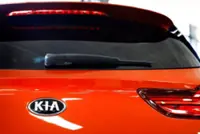
FILE PHOTO: A Tesla Model 3 vehicle is shown using the Full Self Driving Beta software (FSD) while navigating a city road in Encinitas, California, U.S., February 28, 2023. REUTERS/Mike Blake/File Photo
(Reuters) - A U.S. judge on Wednesday rejected Tesla's bid to dismiss a lawsuit accusing Elon Musk's electric car company of misleading owners into believing that their vehicles could soon have self-driving capabilities.
The proposed nationwide class action accused Tesla and Musk of having since 2016 falsely advertised Autopilot and other self-driving technology as functional or "just around the corner," inducing drivers to pay more for their vehicles.
U.S. District Judge Rita Lin in San Francisco said owners could pursue negligence and fraud-based claims, to the extent they relied on Tesla's representations regarding vehicles' hardware and ability to drive coast-to-coast across the U.S.
Without ruling on the merits, Lin said that "if Tesla meant to convey that its hardware was sufficient to reach high or full automation, the [complaint] plainly alleges sufficient falsity."
The judge dismissed some other claims.
Tesla and its lawyers did not immediately respond to requests for comment. Lawyers for Tesla vehicle owners did not immediately respond to similar requests.
The case was led by Thomas LoSavio, a retired California lawyer who said he paid an $8,000 premium in 2017 for Full Self-Driving capabilities on a Tesla Model S, believing it would make driving safer if his reflexes deteriorated as he aged.
LoSavio said he was still waiting for the technology six years later, with Tesla remaining unable "even remotely" to produce a fully self-driving car.
The lawsuit seeks unspecified damages for people who since 2016 bought or leased Tesla vehicles with Autopilot, Enhanced Autopilot and Full Self-Driving features.
Tesla has for many years faced federal probes into whether its self-driving technology might have contributed to fatal crashes.
Federal prosecutors are separately examining whether Tesla committed securities fraud or wire fraud by misleading investors about its vehicles' self-driving capabilities, according to three people familiar with the matter.
Tesla has said Autopilot lets vehicles steer, accelerate and brake in their lanes, and Full Self-Driving lets vehicles obey traffic signals and change lanes.
But it had acknowledged that neither technology makes vehicles autonomous, or excuses drivers from paying attention to the roads.
The case is In re Tesla Advanced Driver Assistance Systems Litigation, U.S. District Court, Northern District of California, No. 22-05240.
(Reporting by Jonathan Stempel in New York; Editing by David Gregorio)










































